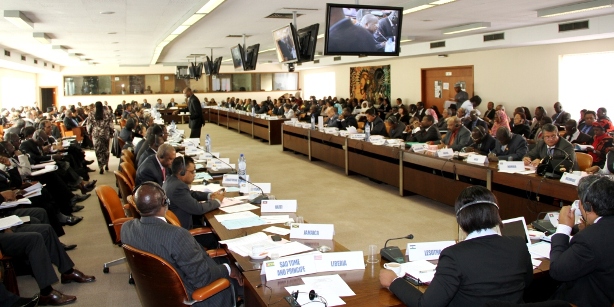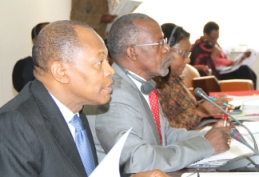SPEECH: Address of the Secretary General at the 27th session of the ACP Parliamentary Assembly, 20 March 2012 in Brussels

(Photo: 27th ACP Parliamentary Assembly Plenary, ACP House)
ADDRESS OF THE SECRETARY GENERAL on the occasion of the 27th session of the ACP Parliamentary Assembly
Brussels, 20 March 2012
—
Mr. President, Members of the ACP Parliamentary Assembly, Ladies and Gentlemen,
On behalf of the ACP Group, I want to express a warm welcome to all of you distinguished parliamentarians to this 27th session of the Parliamentary Assembly. I also want to thank you for giving me this opportunity to address your meeting.
Mr. President,
I was once privileged to serve as a Member of Parliament in my own native Ghana. Ever since then, I have always reserved a special place in my heart for the institution of parliament and for parliamentarians as the embodiment of the will of the people. As a lawyer, I am also in awe of legislators as the spring and fountain of the law and the ultimate bulwark against tyranny and oppressive government.
Honourable Parliamentarians,
Since the ancient Athenians, no democracy has been known to function without a vibrant and steadfast legislature. Parliamentary government is, indeed, the essence of a free society. I am proud to say that the ACP Parliamentary Assembly is one of the most vibrant of our statutory Organs which has gone a long way in enriching the tradition of political dialogue which is one of the pillars of the Cotonou Agreement.
Indeed, through your singular as well as collective efforts and courage, democracy is finally taking root not only in Africa but also in the Caribbean, the Pacific and the islands of the seas. We have been begun to see the fruits of political and economic reforms now reflected in stability, greater freedom for citizens and strong economic growth in many ACP countries. And elections are increasingly credible and transparent such as we have witness lately in Zambia, Senegal, Guyana, Surinam, Timor Lest to name but a few. But regrettably we also continue to see resort to senseless violence and killing of innocent civilians by groups such as Al Shaabad, Boko Haram, Aqmi and the rebels in the North of Mali. We strongly condemn these groups and express our solidarity with the governments and the people of these countries.
I therefore commend you all for the good work you are doing not only in your respective countries but also in that dialogue of civilisations between Europe and the ACP which is so vital to the emergence of a just and peaceful international order.
 Mr. President,
Mr. President,
It was only last month that we met in Lusaka during the Regional Assembly for the SADC region. On that occasion I expressed my delight on your election to the Presidency of the ACP Parliamentary Assembly and to the Co-Presidency of the Joint Assembly. Your impressive record of public service; your solid experience in business and your talent and leadership will no doubt prove to be an asset to the ACP family of nations. I am happy to note that our expectations are being fulfilled, judging by the quality of attendance and the vibrancy that is so palpable here today.
Mr. President,
Honourable Members,
We meet at a time of tumult in international economic relations. What has been termed ‘the Great Recession’ has been more protracted than most economists had expected. Global economic recovery has been rather painfully slow. The Euroland area in particular has recently been afflicted by an unprecedented fiscal crisis in countries such as Greece, Ireland, Portugal and Italy.
Several countries have experienced a downgrade by the international credit ratings agencies, including France, which recently lost her triple ‘A’ rating. Doubts have been expressed in several quarters about the future of the Euro, arguably the world’s alternative reserve currency.
These developments have taken a toll on some of our ACP economies, the bulk of whom export most of their primary products to the European Union. The global economic slowdown is also affecting China which, over the last decade, has served as the primary engine of world prosperity. All of this means that the growth prospects in some of our countries will be negatively affected.
Linked to this is the worsening impact of Climate Change and the relentless onslaught of desertification in the Sahel and the Horn of Africa. The late arrival of rains this year is threatening to lead to severe food deficits in countries such as Mali, Senegal, Burkina Faso, Niger, Mauritania, Djibouti and Somalia. The small island countries of the Pacific face a similar challenge relating to Climate Change. Worsening sea levels and the dumping of garbage in the oceans is having a devastating impact on oceanic ecologies — and by extension — the livelihoods of millions of people.
Mr. President,
The years ahead will no doubt prove to be replete with hurdles. I daresay that we will succeed only if we remain steadfast and unwavering; drawing strength from our collective solidarity – from that indomitable spirit which has sustained our people since time immemorial.
On our part, we at the Secretariat will do our utmost in mobilising whatever resources we can and whatever moral capital we can muster to push the agenda of renewal and transformation forward; working with our traditional development partners in Europe while exploring alternative cooperative arrangements with the emerging economies.
Honourable Parliamentarians,
One of the big challenges facing our regions – in Africa and the Pacific — is the finalisation of the EPA negotiations with Europe. As we all know, the European Commission announced in September last year that countries that have not been able to finalise an EPA will no longer benefit from free market access to Europe as from the 1st of January 2014.
That deadline also coincides with the coming into force of the EU’s new Generalised System of Preferences (GSP); it is also the date by which countries that have signed and initiated the ratification of an EPA would be expected to begin implementation of their trade liberalisation commitments.
I am persuaded that this Assembly has an important role to play in helping our regions reach a fair and equitable settlement in good time.
It is a matter of regret that the EU has imposed such a unilateral deadline which seems in opposition to the letter and very spirit of our time-tested relationship. Even worrisome is the fact that they seem to be imposing terms that some economists even in Europe are decrying as being above even what the WTO would be prepared to impose.
There is also not much understanding in the Berlaymont of the fact that several of our regions are only now completing their customs unions, which are a pre-condition for regional communities to be able to coordinate a common EPA position. In light of the de-industrialising effects of wholesale trade liberalisation, the reluctance to include a development component to the EPAs as some of our regional communities have insisted all along remains a disappointing reality.
While we will continue to work with our regions to take the process forward, we will also continue to use our quiet diplomacy and moral authority to prevail on our EU colleagues to exercise a greater degree of creativity and flexibility – and to tamper the calculus of economic self-interest with a dose of empathy, enlightenment and practical reason.
Mr. President,
Honourable Parliamentarians,
The coming months will be extremely busy for all of us. There is the JPA that is soon to take place in Denmark in the month of May. We also have the Council coming up in Vanuatu in May ending and beginning of June. We also have our Seventh Summit of Heads of State and Government which holds during early December in the central African nation of Equatorial Guinea.
Honourable Parliamentarians,
This is bound to be a highly historic summit. I will therefore urge you to please use every opportunity to impress on your Governments the importance of the summit and why it is of utmost importance that our leaders attend it.
Permit me to also apprise you of the ongoing work on Future Perspectives. Under the wise leadership of H. E. Ambassador Dr. Patrick Gomes of Guyana, a Working Group on the Future of the ACP has been working assiduously to map out viable alternative scenarios for the ACP. The UNDP has also provided funding for a consultant in the person of Prof. Dr. Mirjam van Riesen, a Professor at the University of Tilburg in the Netherlands. Her mandate is to produce a report based on intensive interviews and consultations that will assist the Working Group in finalising its task.
Mr. President,
Honourable Parliamentarians,
What is remarkable about the ACP is that we have been able to stick together through the good times and through the bad. Since the Georgetown Agreement 1975, none of our 79 member countries has ever expressed the remotest desire to leave our association. On the contrary, there has been renewed by several countries either to join or to establish cooperation agreements with the ACP.
This is testimony to the enduring character of our intergovernmental organisation; rooted as it is in the values of solidarity, interdependence, cooperation and mutually shared obligations. However, we must never rest on oars. More than ever before, we must realise that it can no longer be business-as-usual.
For one thing, Europe, our principal development partner, is undergoing profound political and institutional changes. We face a new European architecture with differing priorities and geopolitical interests. The writing on the wall is clear: We will have to adapt or perish. Part of this adaptation will require that we explore South-South partnerships with the emerging economies while deepening our institutional arrangements and reengineering trade and investment linkages with each other.
Mr. President,
According to a wise saying among the ancient Bornu people of north eastern Nigeria, “the pillar of the world is hope”. We have to forge ahead in that hope and optimism that will see us triumph over adversity. Under my watch, the Secretariat will do its part to support you and to ensure that the ACP not only survives but flourishes in the years ahead.
In conclusion, I would like to wish you every success in your deliberations and an enjoyable stay in Brussels.
I thank you for your kind attention.
H.E Dr Mohamed Ibn Chambas
Secretary General
ACP secretariat
***
